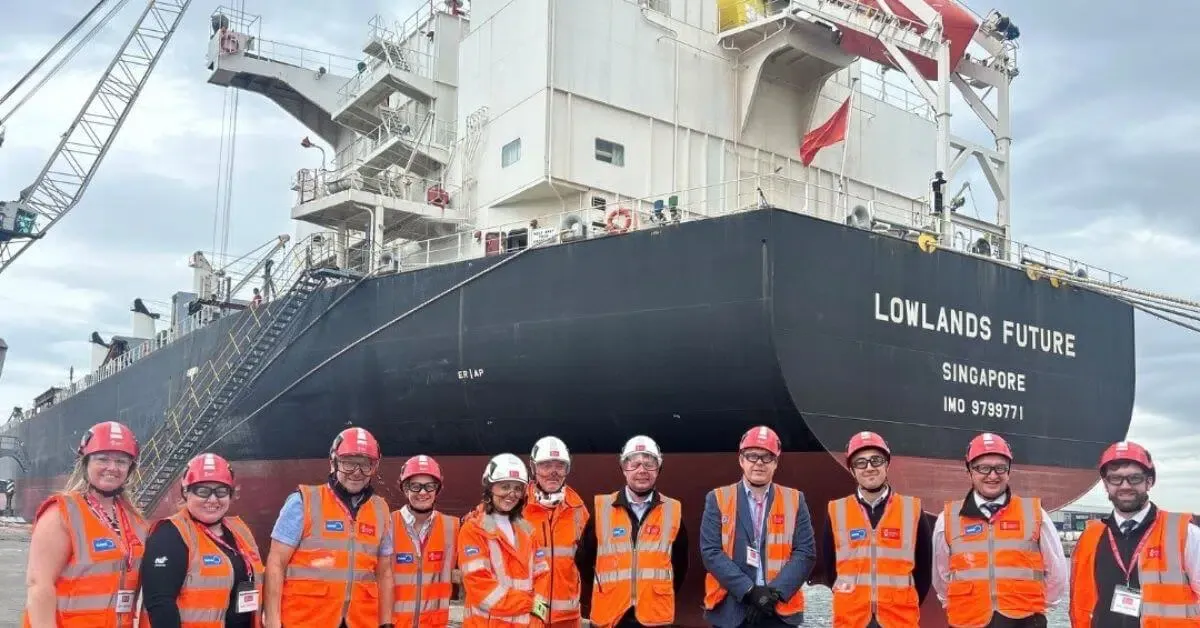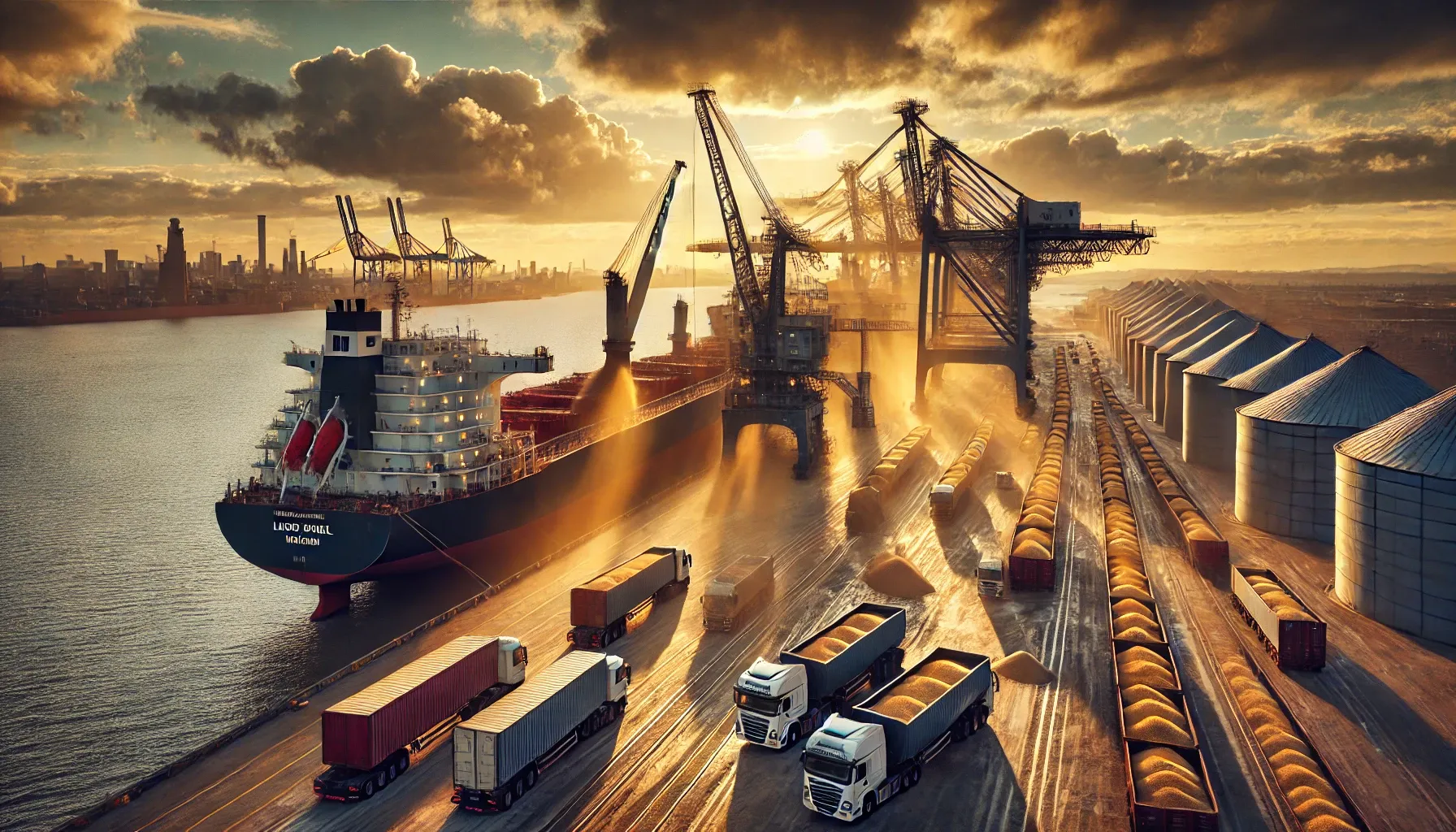Port of Liverpool Welcomes UK's Largest Maize Shipment: A Game-Changer for the Agricultural Supply Chain

On September 19, 2024, the Port of Liverpool marked a significant moment in the UK’s agricultural and trade history by welcoming the largest-ever shipment of feed maize into the country.
The vessel, Lowlands Future, arrived from the east coast of the United States, delivering an impressive 55,000 tonnes of maize. This large volume of feed maize, commissioned by ADM Agriculture, is being stored in ADM’s specialized port-centric facilities before distribution to farms across the UK. The successful reception and handling of this shipment reflect the increasing capacity and sophistication of Liverpool’s port infrastructure, solidifying its position as one of the UK's most critical entry points for agricultural commodities.

The Growing Importance of Feed Imports for UK Agriculture
The significance of this shipment cannot be overstated. The UK’s agricultural sector has been grappling with several challenges in recent years, including fluctuations in domestic crop yields and the growing demands of a rapidly expanding population. This year, in particular, has seen a steep decline in UK wheat production, with a reported 25% drop compared to the previous year.
The shortfall in wheat, a staple in animal feed, has created an urgent need for alternative feed sources, with imported maize taking center stage in the feed rations for both ruminant and monogastric livestock.
The arrival of Lowlands Future is more than just a logistical feat; it represents a critical lifeline for the nation’s farmers. With maize now an essential component in supporting livestock nutrition, this shipment will help ensure the continuity of agricultural operations across the UK. From supporting dairy farms to poultry production, the maize will have far-reaching impacts on various sectors within the agriculture industry, ultimately helping to stabilize food production amidst supply chain challenges.
Albert Linney, Senior Trader at ADM Agriculture, emphasized the importance of the shipment: “In a year where domestic cereals have struggled, imported feed maize has played a crucial role in maintaining consistent nutrition for livestock across the UK. This shipment, the largest in UK history, underscores the critical partnership between ADM and Peel Ports, and our ability to meet the nation’s needs.”
Fortifying Food Security and the National Supply Chain
Food security has emerged as a paramount concern for the UK, particularly in light of global disruptions caused by supply chain issues, climate change, and geopolitical uncertainties.
The ability of the Port of Liverpool to accommodate such large-scale agricultural imports plays a crucial role in strengthening the UK’s food security framework. By ensuring that essential commodities like maize can be efficiently imported and distributed to farms across the country, the port is helping to safeguard the continuity of the food supply chain.
Phil Hall, Mersey Port Director for Peel Ports Group, noted, “This shipment exemplifies our port’s capacity to handle large, complex imports that are crucial to maintaining the nation’s food supply. Our ongoing investments in infrastructure, such as the £28 million dry bulk facility at Alexandra Dock, are aimed at enhancing our ability to serve the agriculture sector and the wider economy.”
This growing demand for imported maize also highlights a broader shift in the UK’s agricultural landscape. As farmers continue to adapt to changing climatic conditions and fluctuating crop yields, having access to reliable imports from international partners has become an essential component of the nation’s agricultural strategy.
The Role of Infrastructure in Shaping the Future of Trade
The arrival of the largest maize shipment also highlights the critical role that infrastructure plays in supporting trade and the national economy. The Port of Liverpool, long recognised as a key gateway for grain, animal feed, and freight, is currently undergoing a major expansion that will further cement its status as a leading hub for imports and exports.
With the construction of a second container terminal on the River Mersey, Liverpool is positioning itself as a vital alternative to the congested ports in the southeast of England. This new terminal, backed by a €185 million loan from the European Investment Bank, will allow the port to handle larger container ships, accommodating growing global trade volumes. When completed, the terminal will double the port’s container capacity to one million TEU (twenty-foot equivalent units), making it a cost-effective and efficient option for trade from the north of the UK and beyond.
Gary Hodgson, Chief Operating Officer of Peel Ports Group, explained, “Currently, 90% of containers coming into the UK arrive through ports in the Southeast, but 60% of these are destined for the north of the country or Ireland. By expanding Liverpool’s capacity, we can reduce costs, alleviate congestion, and streamline the supply chain for businesses in the region.”
Supporting the National Economy and Global Trade Networks
The significance of Liverpool’s port operations extends beyond agriculture. As one of the largest port operators in the UK, Peel Ports Group plays a central role in shaping the country’s economy by facilitating trade across multiple sectors. With the UK’s reliance on imports growing, particularly in agricultural commodities, the ability to handle larger shipments and ensure their timely distribution is critical for maintaining the health of the national economy.
The port’s expansion is also set to benefit the global trade network, offering a more seamless connection between Britain, Ireland, and other key international markets.
As the global economy continues to shift and evolve, ports like Liverpool will be crucial in maintaining the flow of goods, minimising delays, and reducing transportation costs for businesses and consumers alike.
A Glimpse into the Future of UK Trade and Agriculture
The arrival of the UK’s largest feed maize shipment at the Port of Liverpool marks a new chapter in the nation’s agricultural journey. As the port continues to invest in cutting-edge infrastructure and expand its capacity, it will play an increasingly vital role in ensuring the resilience of the UK’s food supply chain. By providing a reliable gateway for agricultural imports and supporting the broader economy, Liverpool’s port is set to be at the forefront of the UK’s trade and agricultural sectors for years to come.
In an era where food security and supply chain resilience are of utmost importance, the Port of Liverpool stands as a shining example of how strategic infrastructure investment and international partnerships can help safeguard the future of a nation’s agricultural and trade networks.
